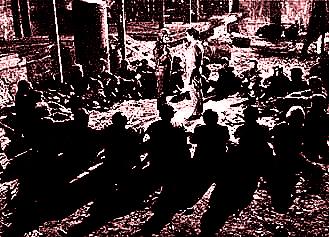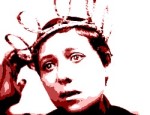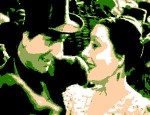Film Review

The most pressing social issue in France in the late 1950s was the problem of juvenile delinquency. Stemming from scarcity of housing and secure, well-paid employment, the situation was exacerbated by the beginnings of the breakdown of the nuclear family in the years following the Second World War. It was not a uniquely French problem - the same phenomena existed throughout many countries in the West, including Britain and the United States. An active interest in this matter by many socially conscious filmmakers led to the emergence of a new kind of cinema, social realism, known pejoratively as kitchen sink dramas.
The best known film of the period to tackle the issue of juvenile delinquency was Nicholas Ray's Rebel Without a Cause (1955), the film that made its lead actor, James Dean, a cultural icon for his generation. The nearest equivalent film in France, in terms of style and impact, was François Truffaut's Les 400 coups (1959). Truffaut was one of those Rottweiler critics on the Cahiers du cinéma who would become one of the leading figures of the French New Wave in the 1960s. Several of the filmmakers he and his colleagues had considered as "out of touch" also made films about France's youth problems and showed as much empathy with and concern over the issue as their Nouvelle Vague rivals. These included: Jean Delannoy, with Chiens perdus sans collier (1955), Julien Duvivier with Boulevard (1960) (which featured the star of Truffaut's film, a young Jean-Pierre Léaud) and Marcel Carné, with Les Tricheurs (1958) and Terrain vague (1960). Of these, Terrain vague alone rivals the impact and charm of Les 400 coups and should be regarded as one of Carné's most inspired and timely films.
Partly as a result of the hammering that Carné had received from opinionated critics in the mid-1950s, Terrain vague received very mixed reviews when it was first released. Admittedly, the film has its flaws - the plot is a tad contrived and has a tendency to slip into melodrama every so often - but, in its favour, it is a pretty accurate representation of how things were at the time, and has something of the uncompromising starkness seen in contemporary Italian neo-realist films - notably Pasolini's Accattone (1961).
Marcel Carné's direction and Claude Renoir's cinematography are anything but démodé and vividly evoke the rough, precarious world in which the unloved, alienated protagonists live. Working with so many inexperienced actors is always a gamble, but Carné gets the best out of his young cast, and the result is a film that is thought-provoking, poignant and, at times, shocking (with its overt suggestions of incest and teenage rape). The film's two principal setting - the blocks of cheap apartments with their interminable staircases and the ruins of an old factory - provide apt visual metaphors for the world in which the socially excluded youngsters live and their far from appealing future: an ordered life of soulless drudgery or a freer life of squalor, crime and deprivation.
Both Marcel Carné's Terrain vague and François Truffaut's Les 400 coups remain surprisingly relevant to this date. The problem of juvenile delinquency has not gone away and, if anything, only appears to show signs of increasing as the traditional family unit rapidly becomes a thing of the past. Both films are worth watching, but it is Terrain vague which more forcefully encapsulates the situation and is more likely to prompt the spectator into engaging with what is becoming one of the most important social issues of our time.
© James Travers 2008
The above content is owned by frenchfilms.org and must not be copied.
Film Synopsis
For the rebellious youngsters on a deprived Parisian housing estate, home is not a tiny room in a cramped apartment but a place amongst the shattered ruins of a derelict factory on a barren wasteland nearby. Their true family are not the dreary grown-ups who abuse and threaten them, but the other members of their gang, who are united in open rebellion against the adult world. The leader of the gang is Dan, a strong-headed teenage girl, almost a woman, who has earned the respect of her rough male cohorts. Babar is the gang's latest eager recruit, although it is with trepidation that he faces the daunting initiation test. All is well until a hot-headed juvenile, Marcel, pushes his way into the gang, having escaped from a youth rehabilitation centre. Having alienated Dan, he persuades the other members of the gang to join him in holding up a petrol station. The scheme falls through and Marcel runs off in disgust. The rest of the gang find two easy scapegoats for this failure - Babar and Lucky, Dan's boyfriend - and set about instigating their own idea of justice...© James Travers
The above content is owned by frenchfilms.org and must not be copied.
Similar Films
Here are some other films you may enjoy watching:- Sons and Lovers (1960)
- Rocco e i suoi fratelli (1960)
- Nous sommes tous des assassins (1952)
- Les Condamnés (1948)
- L'Homme au chapeau rond (1946)
Other related links:
Film Credits
- Director: Marcel Carné
- Script: Marcel Carné (dialogue), Hal Ellson (novel), Henri Jeanson (story), Henri-François Rey (dialogue)
- Cinematographer: Claude Renoir
- Music: Michel Legrand, Francis Lemarque
- Cast: Danièle Gaubert (Dan), Roland Lesaffre (Big Chief), Maurice Caffarelli (Lucky), Constantin Andrieu (Marcel), Jean-Louis Bras (Babar), Dominique Dieudonné (Le râleur), Denise Vernac (Marcel's mother), Dominique Davray (Dan's mother), François Nocher, Alfonso Mathis, Pierre Richard, Georges Wilson, Simone Berthier, Pierre Collet, Claudine Auger, Pierre Parel, Anne Béranger, Gib Grossac, Georgette Peyron, Jacques Berger
- Country: Italy / France
- Language: French
- Support: Black and White
- Runtime: 105 min
- Aka: Wasteland
The best French Films of the 1920s

The greatest French Films of all time

The best French war films ever made
